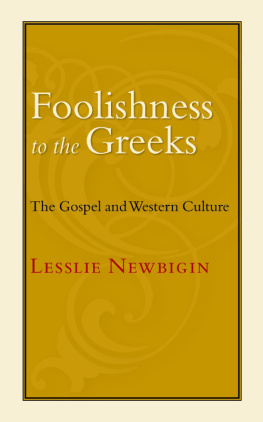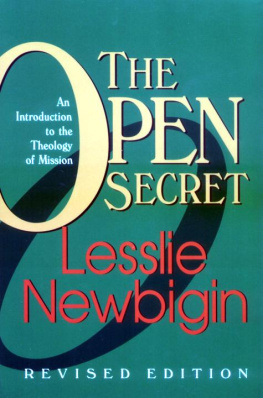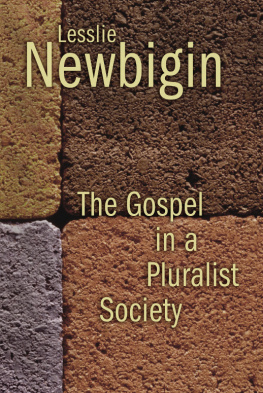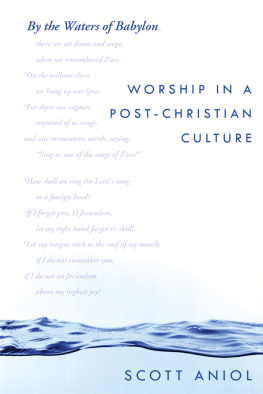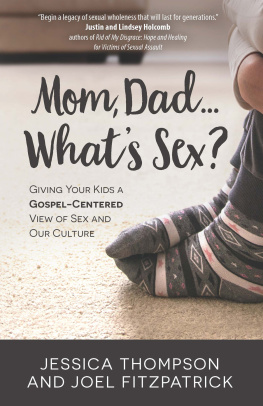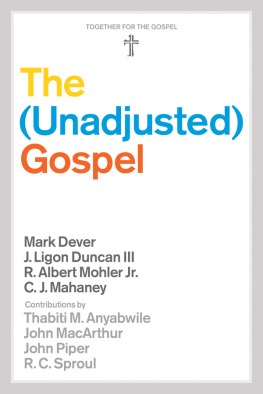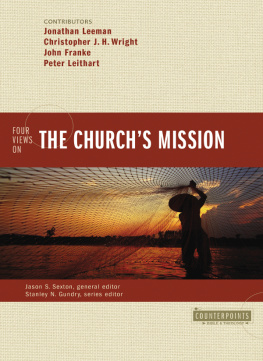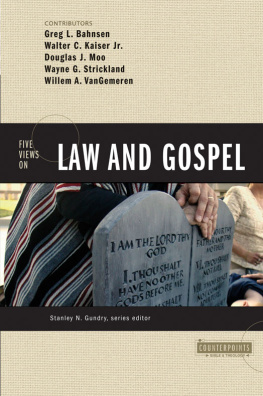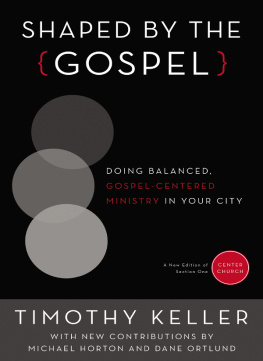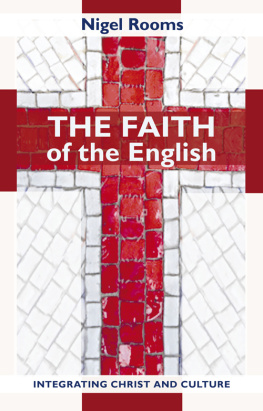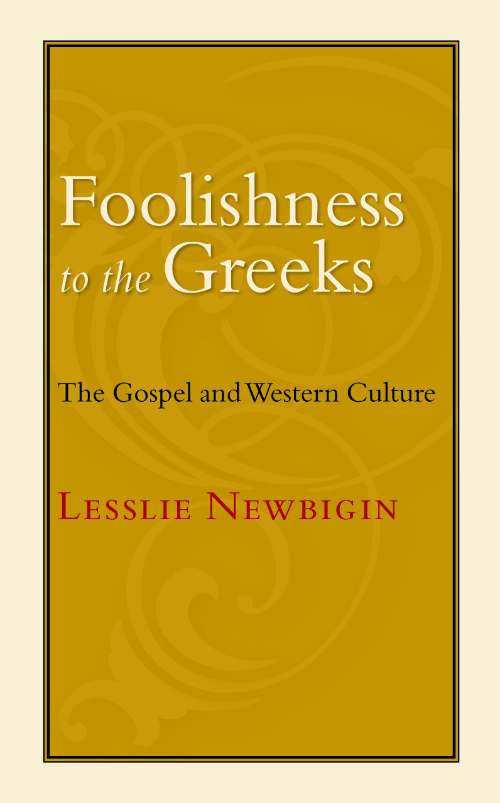
Foolishness to the Greeks
The Gospel and Western Culture
Lesslie Newbigin
W ILLIAM B . E ERDMANS P UBLISHING C OMPANY
G RAND R APIDS, M ICHIGAN / C AMBRIDGE, U . K .
1986 Wm. B. Eerdmans Publishing Co.
All rights reserved
Wm. B. Eerdmans Publishing Co.
2140 Oak Industrial Drive N.E., Grand Rapids, Michigan 49505 /
P.O. Box 163, Cambridge CB3 9PU U.K.
Library of Congress Cataloging-in-Publication Data
Newbigin, Lesslie.
Foolishness to the Greeks.
Expanded version of the Warfield Lectures given at Princeton Theological Seminary, March 1984.
Includes .
1. Christianity and cultureAddresses, essays, lectures. 2. MissionsAddresses, essays, lectures.
I. Title
BR115.C8N467 1986 261 86-2113
ISBN 978-0-8028-0176-0 (pbk.: alk. paper); 978-1-4674-1908-6 (ePub); 978-1-4674-0108-1 (Kindle)
www.eerdmans.com
Contents
The following chapters are a somewhat expanded version of the Warfield Lectures given at Princeton Theological Seminary in March 1984. I am deeply grateful to Dr. James McCord, then president of the seminary, who did me the honor of inviting me to give these lectures and to President Gillespie and his colleagues on the faculty who received me with the greatest kindness and hospitality.
At the time I received the invitation I had recently written a small pamphlet entitled The Other Side of 1984, an invitation to the British churches to a more forthright missionary encounter with contemporary British culture, and was much occupied with the resulting discussion. I therefore decided to use this invitation as an opportunity to develop more fully the message of that booklet. This book is the result.
It would be impossible to acknowledge the many debts I owe to friends who have helped me in trying to understand what would be involved by a more explicit missionary encounter with our culture. I hesitate to name any of them lest it might appear that they had some responsibility for my errors. However, I must acknowledge the kindness of Dr. David Ford and Professor Colin Gunton, who read a first draft and made helpful suggestions, and of Dr. Arthur Peacocke, who read was prepared by Mrs. Hazel Clawley. And, once again, I must express my debt to Verleigh Cant who, with unfailing skill and patience, converted my illegible writing into lucid type.
L ESSLIE N EWBIGIN
Selly Oak
Advent 1985
My purpose in these chapters is to consider what would be involved in a genuinely missionary encounter between the gospel and the culture that is shared by the peoples of Europe and North America, their colonial and cultural off-shoots, and the growing company of educated leaders in the cities of the worldthe culture which those of us who share it usually describe as modern. The phenomenon usually called modernization, which is being promoted throughout much of the Third World through the university and technical training network, the multinational corporations, and the media, is in fact the co-option of the leadership of those nations into the particular culture that had its origin among the peoples of western Europe. For the moment, and pending closer examination of it, I shall simply refer to it as modern Western culture.
The angle from which I am approaching the study is that of a foreign missionary. After having spent most of my life as a missionary in India, I was called to teach missiology and then to become a missionary in a typical inner-city area in England. This succession of roles has forced me to ask the question I have posed as the theme of this book: What would be involved in a missionary encounter between the gospel and this whole way of perceiving, thinking, and living that we call modern Western culture? There is, of course, nothing new in proposing to discuss the relationship between gospel and culture. We have Richard Niebuhrs classic study of five models of relationship in his book Christ and Culture. We have had the massive work of Paul Tillich, who was so much concerned with what he called, in the title of his first public lecture, the theology of culture. But this work has mainly been done, as far as I know, by theologians who had not had the experience of the cultural frontier, of seeking to transmit the gospel from one culture to a radically different one.
On the other hand, we have had a plethora of studies by missionaries on the theological issues raised by cross-cultural missions. As Western missionaries have shared in the general weakening of confidence in our modern Western culture, they have become more aware of the fact that in their presentation of the gospel they have often confused culturally conditioned perceptions with the substance of the gospel, and thus wrongfully claimed divine authority for the relativities of one culture.
For some on the liberal wing of Protestantism, such as W. E. Hocking, Christian missions were to be almost absorbed into the worldwide spread of Western culture, and this was quite explicit. But those at the opposite end of the spectrum, the conservative evangelicals, were often unaware of the cultural conditioning of their religion and therefore guilty, as many of them now recognize, of confusing the gospel with the values of the American way of life without realizing what they were doing. In the last couple of decades there has been a spate of missionary writings on the problem of contextualization. This has been preferred to the terms indigenization and adaptation, earlier much used by Protestants and Catholics respectively. The weakness of the former was that it tended to relate the Christian message to the traditional cultural formsforms that belonged to the past and from which young people were turning away under the pervasive influence of modernization. The effect was to identify the gospel with the conservative elements in society. The weakness of the latter term, adaptation, was that it implied that what the missionary brought with him was the pure gospel, which had to be adapted to the receptor culture. It tended to obscure the fact that the gospel as embodied in the missionarys preaching and practice was already an adapted gospel, shaped by his or her own culture. The value of the word contextualization is that it suggests the placing of the gospel in the total context of a culture at a particular moment, a moment that is shaped by the past and looks to the future.
The weakness, however, of this whole mass of missiological writing is that while it has sought to explore the problems of contextualization in all the cultures of humankind from China to Peru, it has largely ignored the culture that is the most widespread, powerful, and persuasive among all contemporary culturesnamely, what I have called modern Western culture. Moreover, this neglect is even more serious because it is this culture that, more than almost any other, is proving resistant to the gospel. In great areas of Asia, Africa, and Oceania, the church grows steadily and even spectacularly. But in the areas dominated by modern Western culture (whether in its capitalist or socialist political expression) the church is shrinking and the gospel appears to fall on deaf ears. It would seem, therefore, that there is no higher priority for the research work of missiologists than to ask the question of what would be involved in a genuinely missionary encounter between the gospel and this modern Western culture. Or, to put the matter in a slightly different way, can the experience of missionaries in the cross-cultural transmission of the gospel and the work of theologians who have worked on the question of gospel and culture within the limits of our modern Western culture be usefully brought together to throw light on the central issue I have posed?
Next page
